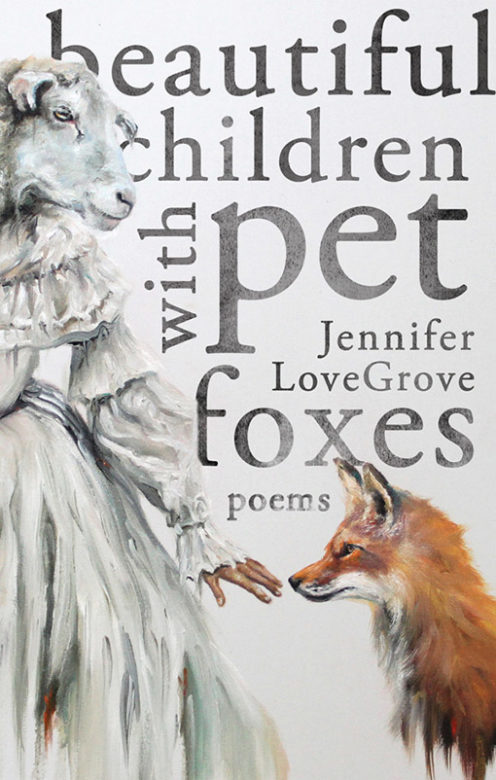Beautiful Children with Pet Foxes. Jennifer LoveGrove. Book Thug. Toronto, Ontario. 2017.


Today's book of poetry isn't exactly sure what reality governs the world of Jennifer LoveGrove poetics but we were certainly happy to venture into Beautiful Children with Pet Foxes. This world feels remarkably similar to our own, even familiar at times, but there is a gossamer shadow casting a silhouette, a new dimension, over this world and LoveGrove is here to guide us through.
When I say that these poems are fun Today's book of poetry is not suggesting that they are slight in any way, quite the contrary, you can feel the weight of these almost ominous messages. Beautiful Children with Pet Foxes is fun because it gives voice to a previously undiscovered universe.
Brock Street
Three white-tailed deer
on the sidewalk:
hooves polished, giddy rural expats
bored of leaves, martini-eager,
greedy for dancing.
Back home, a forest opens its fist.
In its palm, a clearing.
A barb-faced eagle
flies his shadow overhead.
First a kite, then a shroud.
Plucks a rabbit
from a little girl's lap.
We three skitter home at dawn,
as a Taser-hipped cop
wedges his boot onto
a man's neck. We shout,
click our camera phones,
file sprawling reports.
In the morning
the street is clean
and we are hungry.
We look down at our feet
and see our hooves
are caked with mud.
...
LoveGrove's poetry is a bit like that dream you can't fully remember and you can't fully escape. You know you are involved in an important struggle, you reach to fit disparate pieces into a story. LoveGrove compels us along on the journey into her dream scape with circumstance and nuance, but she keeps us there with language. LoveGrove runs a tight ship.
Today's book of poetry loved that Beautiful Children with Pet Foxes brims with new ideas. Literally shimmering with unexpected whimsy, LoveGrove drops beautiful bombshell titles like "Autumn Takes its Rifle for a Walk" on the reader like bon mots.
Today's book of poetry has long been a fan of LoveGrove. Milo, our head tech, brought her two previous poetry titles out of the stacks for us this morning, The Dagger Between Her Teeth (ECW, 2202) and I Should Never Have Fired the Sentinel (ECW, 2005). We thoroughly enjoyed those books when we first acquired them, they are even better now. Jennifer LoveGrove has constant velocity, the poems in this volume move along with a brisk pace.
Self Portrait as a Leaky Boat
I'm the stainless steel handle
slouching on the bailing bucket
I'm a yellow tow rope
coiled on the floor
I'm the reeking sulphur
in the waterproof flare
I'm the life vest's plastic clasp
that doesn't quite close
I'm the needle in the compass
red tip bitten off
I'm a little orange whistle
crawling into your mouth
I'm the sudden winds
sneaking up lee side
I'm the heavy cloud
shuttering the moon
I'm a search party of one
my chapped hands empty
...
This morning's reading was taken in hand by Kathryn, our Jr. Editor, just returned from several happy days roaming Paris. Kathryn romped us through Beautiful Children with Pet Foxes and then skipped us through The Dagger Between Her Teeth and I Should Never Have Fired the Sentinel for good measure. LoveGrove would have enjoyed the enthusiasm shown her poems.
The title poem from Beautiful Children with Pet Foxes is inhabited by ghosts. Ghosts appear more than once in this collection but they are essentially well mannered as LoveGrove weaves them in and out of her dreams. It all seems normal, it all seems correct, but by the time you've finished Beautiful Children... you will want/need a pet fox too.
Dream Specimen 95
I'm alone in trees as the day dissolves
to a bright royal blue, glowing thick
and settling on the world like a balm.
I feel free and smile and throw
my arms wide like when no one
has betrayed you in a really long time.
Then a white pickup truck full of four bellowing bros
hurtles into the clearing, splinters the trees
and crumples right next to me.
Posture still perfect, their pale heads
ringed with blood like the crowns
they thought they already wore.
...
Excellent.
Today's book of poetry is tickled pink to bring you Jennifer LoveGrove's Beautiful Children with Pet Foxes, we loved this title. But that was no surprise at all.

Jennifer LoveGrove
ABOUT THE AUTHOR
Jennifer LoveGrove is the author of the Giller Prize–longlisted novel Watch How We Walk, as well as two poetry collections: I Should Never Have Fired the Sentinel and The Dagger Between Her Teeth. In 2010, LoveGrove was nominated for the K.M. Hunter Artist Award for Literature and in 2015, her poetry was shortlisted for the Lit POP Awards. Her writing has appeared in numerous publications across North America. She divides her time between downtown Toronto and rural Ontario.
BLURB
“LoveGrove’s poetry apprentices itself to the world we live in, pacing out the dimensions of the enclosure called the present–the enclosures of culture, history, family, and other patriarchal institutions–with a keen eye and a relentless heart. In pursuit simultaneously of holistic perception, love, and an escape route, LoveGrove invites words to hold hands in unusual combinations, enters dreams and lets consciousness run feral. “There was a war going on and / ours was a very important mission,” LoveGrove writes, and it’s true.”
—Helen Guri, author of Match
Jennifer LoveGrove reading from Beautiful Children with Pet Foxes
at the 2017 BookThug Spring Launch
Video: Jay MillAr
603
DISCLAIMERS
Poems cited here are assumed to be under copyright by the poet and/or publisher. They are shown here for publicity and review purposes. For any other kind of re-use of these poems, please contact the listed publishers for permission.
We here at TBOP are technically deficient and rely on our bashful Milo to fix everything. We received notice from Google that we were using "cookies"
and that for our readers in Europe there had to be notification of the use of those "cookies. Please be aware that TBOP may employ the use of some "cookies" (whatever they are) and you should take that into consideration.



![Primer (Pitt Poetry Series) by [Smith, Aaron]](https://images-na.ssl-images-amazon.com/images/I/51YMZ2l7rVL.jpg)




